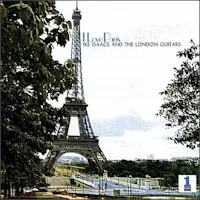Time: 60:51
Size: 139.3 MB
Styles: Trombone jazz
Year: 2011
Art: Front
[9:43] 1. Get Out Of Town
[8:46] 2. Dream Dancing
[4:51] 3. Night And Day
[4:25] 4. Easy To Love
[8:25] 5. C'est Magnifique
[7:16] 6. Just One Of Those Thimgs
[4:28] 7. Ballad For A Friend
[7:05] 8. What Is This Thing Called Love
[5:47] 9. I Love You, Samantha
George Masso - trombone; Lou Colombo – trumpet, flugelhorn; Harry Allen – tenor sax; Johnny Varro - piano; Phil Flanigan - bass; Jake Hanna - drums. Recorded live on March 6, 1999 at the Hanse Merkur Auditorium, Hamburg.
An excellent trombonist who records for Arbors, George Masso has had a long if somewhat underrated career. Other than some early gigs (including a 1948 association with Jimmy Dorsey), Masso made his living from teaching in schools up until 1973. However, he always played trombone on the side and, soon after becoming a full-time musician, he toured with the Benny Goodman Sextet (1973). Masso worked with Bobby Hackett, Bobby Rosengarden, and the World's Greatest Jazz Band (the latter starting in 1975) and recorded with Scott Hamilton, Warren Vache, and Woody Herman. He led sessions for Famous Door, World Jazz, and Dreamstreet during 1978-1983, frequently sharing the front line with tenor saxophonist Al Klink and trumpeter Glenn Zottola. Since then, George Masso has recorded for Sackville and Arbors and become a reliable fixture at jazz parties and classic jazz festivals. ~ bio by Scott Yanow
An excellent trombonist who records for Arbors, George Masso has had a long if somewhat underrated career. Other than some early gigs (including a 1948 association with Jimmy Dorsey), Masso made his living from teaching in schools up until 1973. However, he always played trombone on the side and, soon after becoming a full-time musician, he toured with the Benny Goodman Sextet (1973). Masso worked with Bobby Hackett, Bobby Rosengarden, and the World's Greatest Jazz Band (the latter starting in 1975) and recorded with Scott Hamilton, Warren Vache, and Woody Herman. He led sessions for Famous Door, World Jazz, and Dreamstreet during 1978-1983, frequently sharing the front line with tenor saxophonist Al Klink and trumpeter Glenn Zottola. Since then, George Masso has recorded for Sackville and Arbors and become a reliable fixture at jazz parties and classic jazz festivals. ~ bio by Scott Yanow
Still Burning!




















